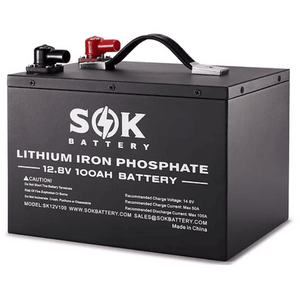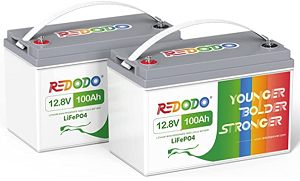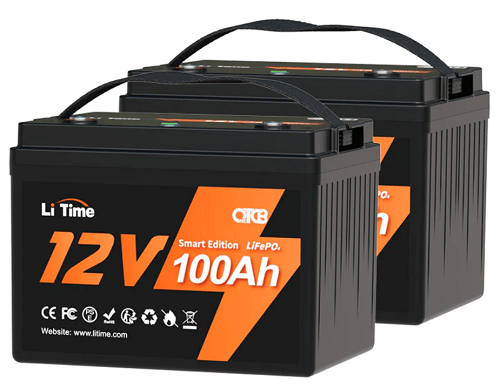In this article, I will compare the best lithium batteries.
I will tell you which one to choose based on these criteria:
- Companies reputation and warranty
- User satisfaction
- Internal workmanship (safety)
- Price
These are the best LifePo4 batteries
| Best Overall | Runner-up | Best Alternative |
 |
 |
 |
| Li Time |
SOK Plus | Redodo |
| Best overall battery because of good build quality, reliability, and price | Best battery for rugged conditions like vans and campers | Two 12V 100Ah batteries, excellent customer service |
| 5/5 build-quality | 5/5 build-quality | 5/5 build-quality |
| 5/5 price | 4/5 price | 4.5/5 price |
| 5/5 Customer service | 5/5 Customer service | 5/5 Customer service |
Best Lithium Batteries
Best Value LiFePO4 battery – Li Time

LiTime is known as Ampere Time. They have re-branded their battery line-up.
They have two versions, the normal and the mini. The mini uses pouch cells, while the normal version uses prismatic cells. Prismatic cells will last longer but are a bit bigger. I recommend using their normal version. This is the most value for money you will get. Here are a few remarkable features of this pricepoint:
- Low-temperature cutoff for the smart version
- One-touch button to activate the battery
- Supports connection of 4 batteries in series and 4 in parallel (total 16). This is useful if you want to expand your system later.
- 100A charge and discharge rate
There are two other models for this battery.
| Version | Bluetooth | Low temp protect | Heater | Price |
| Standard | No | No | No | |
| Smart | Yes | Yes | No | |
| Heating | No | Yes | Yes |
Use promo code ‘cleversolarpower’ at checkout and receive a 3% discount at the official LiTime store.
If you use the battery in freezing temperatures, I recommend getting the version with a built-in heater.
LithiumSolar reviews the Smart Battery with a low-temperature cutoff in the following video.
Choose the basic version if you want the best budget LiFePO4 battery (also called lfp battery). There is no Bluetooth connectivity and no low-temperature protection.
Runner up – SOK Plus

If your battery needs to be capable of absorbing vibrations or shocks like in a vehicle, then I recommend using the SOK Lithium battery.
SOK has an excellent reputation for delivering quality batteries at a reasonable price. They even offer a 7-year warranty if you buy from current-connected. They add 3 more years to that.
They have several versions:
- Plus version
- Pro version -> cannot be connected in series to make 24 or 48V
- Marine version
Some remarkable features of the battery are:
- Metal case
- The metal bracket inside holds the cell in place
- Low-temperature cutoff on all versions
- All except the heated version can be connected in series.
- 50A charge and 100A discharge rate.
Here is a list of all the available 12V 100Ah Lithium batteries from SOK:
| Type | Bluetooth | Low temp protect | Heater | Price |
| Plus (Bluetooth) | Yes | Yes | No | |
| Pro (heating) | Yes | Yes | Yes | |
| Marine (IP65) | Yes | Yes | No |
Watch the video review by Love your Rv:
Best Alternative – Redodo
Redodo, formerly known as Zoom battery have rebranded their barry line.
I don’t have experience with them personally, but the reviews on amazon are all very positive. The customer service seems great. If you want to have a two pack of 12V 100Ah batteries, then this is your best choice. If you order this battery you can make a 24V 100Ah battery or a 12V 200Ah battery.
This battery doesn’t have low-temperature protection, so if you plan on using this battery, make sure your charge controller has a temperature sensor so it will disable the charging when the temperature goes below 5°C (41°F).
Lithiumsolar did a great review and teardown of this battery:
FAQ about LiFePO4 Batteries
Is LiFePO4 better than lithium-ion?
Lithium-ion or Li-ion batteries are found in cell phones. These batteries are made for fast charging, but trade that with lifespan.
Did you notice that your phone’s battery has been reduced over its first few years?
If we change the batteries in our phones with LiFePO4 battery cells, we will get a longer lifetime, but the charging will take longer. That’s why a healthy trade-off with cycle life and charging speed has been made, and that’s why our phones use Li-ion batteries.
LiFePO4 batteries are in the same category as Li-ion batteries. Lithium iron phosphate is like part of the Li-ion family.
For solar systems, LiFePO4 is still preferred because it’s safer and doesn’t contain cobalt (source).
How good are LiFePO4 batteries?
Lithium iron Phosphate batteries have come a long way since their early development in 1996. These kinds of batteries are used in solar systems or electric vehicles.
Their development has made these the go-to battery chemistry for these applications.
Can lithium batteries last 10 years?
Yes, if we use the cycle life of lithium cells we can calculate the following:
6,000 cycles / 365 days = 16,4 years
After these cycles, there will still be 80% capacity left. If you want to learn more about this, then read my full article here.
Conclusion
This article showed the best budget, durable, and reputable battery brands if you want to buy a lithium (LiFePO4) 12V 100Ah battery.

Since their smart battery is sold out, we have selected this as the best 12V LiFePO4 battery. This battery comes at a great price but without smart functions.

I’m an off-grid enthusiast. I created this website to give clear and straight-to-the-point advice about solar power. I’m also the author of the book ‘Off-grid solar power simplified‘. Read more about me on my about page, check out my Youtube channel, or send me a message.
I would like to know which battery should I buy for my off grid coiling systems in Africa?
Champion 1, Li Time or which one?
It depends on your needs. I recommend using my off-grid solar calculator. Then you can see how many batteries you will need. If you need more than 5kW of storage, then I recommend using a server rack lithium battery.
I’m looking at the all in one VICTRON EasySolar 24/3000/70-50 150/70
Which is 3000va I believe is a 2400w inverter.
To be powered by only a “single” CANADIAN SOLAR HiKu6 CS6W-550MS 550W Solar panel.
What configuration of batteries would be needed to work with this combination. Without damaging the batteries.
Obviously with working within the limits that would be available with this system.
https://meda.co.nz/products/canadian-solar-mono-solar-panel-550-watt
https://dcpower.co.nz/wp-content/themes/dcpower/uploads/Easysolar-Datasheet.pdf
Powered by a single 550W solar panel? You need to be aware that the victron has an idle current too I’m guessing around 30W. I would go for two Litime 12V batteries connected in series. To get a good estimate use my load calculator here.
Hi Nick I would like to use solar for my air conditioner in summer and also use it on my furnace in the winter and nothing else using a converter ,batteries and solar panels could you tell me what system to use in this format Thank you for your help
Hello Brian, Adding an air conditioner is quite complex. I recommend using a soft starter otherwise your inverter will have to be big to handle the surge power. I have made a video about figuring out your system. Watch it here Checkout my load calculation tool too here.
Just curious, have you looked into the WattCycle series?
I saw a tear down on the 12v and the 12v 100ah mini, and was impressed.
I just bought 6 of the 12v mini w/bluetooth, and am running them in 24 volt series / parallel.
Haven’t cycled them more than once or twice and so far, so good.
They have all tested out at a minimum of 102 AHr and seem to come back up and balance ok.
I have started at a lower ‘float’ voltage though, about 27.3 v just to see how they work at less than a totally ‘full’ recharge. Most of the internal BMSes indicate 99% charge or better, and I’m just trying to avoid ‘slamming’ them up into the ‘high voltage charge’ disconnect, which they all did, if I used a 29.2v charger.
I haven’t. But it seems like they are decent.